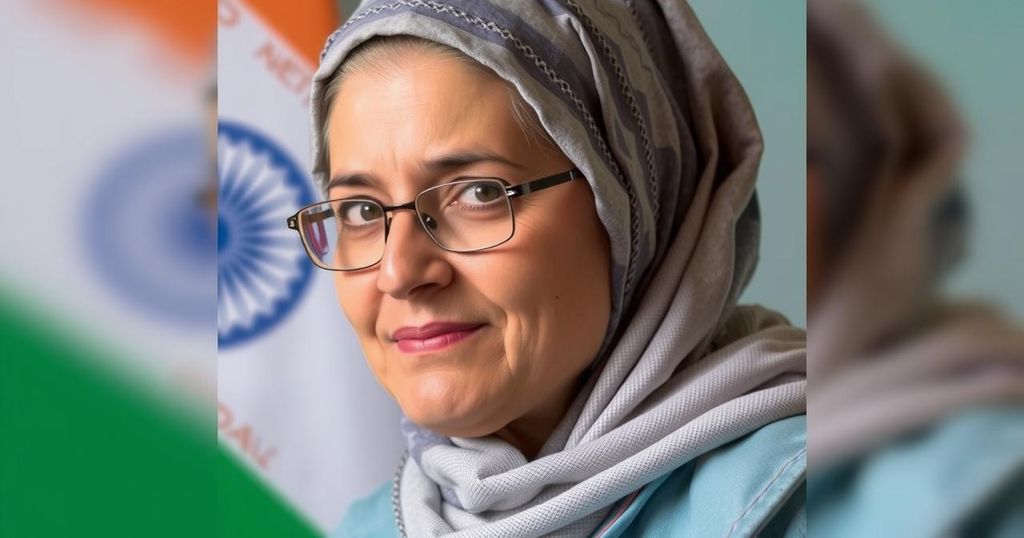Iran has offered humanitarian assistance in the case of Indian nurse Nimisha Priya, sentenced to death in Yemen for the 2017 murder of a Yemeni national. Nimisha Priya’s dire circumstances involved years of abuse by her partner leading to lethal action for self-defense. The case reflects the broader geopolitical tensions in the Middle East while showcasing Iran’s humanitarian outreach and India’s diplomatic efforts to assist its citizen.
In a significant recent development regarding international humanitarian efforts, Iran has offered assistance in the case of Nimisha Priya, an Indian nurse sentenced to death in Yemen. The Iranian government’s proposition reflects the intertwined nature of diplomacy and humanitarian concerns in the context of ongoing geopolitical conflicts within the Middle East region.
Nimisha Priya, a nurse from Kerala, India, has been condemned to death by the Houthi-led authorities in Yemen for her involvement in the 2017 death of a Yemeni citizen, Talal Abdo Mahdi. Once in a professional partnership with Mahdi, Priya’s circumstances deteriorated as their relationship became abusive. Following years of alleged manipulation, harassment, and threats from Mahdi, she attempted to sedate him in July 2017 to escape his control. Unfortunately, Mahdi succumbed to a drug overdose, leading to Priya’s arrest and subsequent death sentence despite her claims of acting in self-defense.
Iran’s unexpected but significant gesture towards Nimisha Priya underscores its commitment to humanitarian issues amid regional political complexities. A senior Iranian official remarked, “We will take up the issue of this nurse, we will do whatever we can.” This statement reveals Iran’s intent to advocate for Priya’s situation based on humanitarian grounds, emphasizing their readiness to intervene if an opportunity arises. Iran’s influence in Yemen, where it has established considerable regional authority, may provide a potential avenue for advocacy on Priya’s behalf.
Simultaneously, the Indian government, through its Ministry of External Affairs (MEA), has assured its awareness of the situation, emphasizing the measures being taken to support Priya. MEA spokesperson Randhir Jaiswal stated, “We are extending all possible help in the matter,” reflecting the government’s commitment to assisting Priya. Civil society groups, such as the Save Nimisha Priya forum, have intensified their calls for negotiations with Yemeni authorities to halt the execution, stressing the urgent nature of the situation.
This offer from Iran occurs amid a backdrop of increasingly robust diplomatic ties between India and Iran, which have been established over centuries of shared cultural and economic interests. In recent years, both nations have endeavored to enhance collaboration across various sectors, including energy, trade, and security. Noteworthy events, such as Indian Prime Minister Narendra Modi’s visit to Tehran in 2016 and the ongoing development of the Chabahar Port project signify the deepening strategic partnership. Recently, Dr. Takht Ravanchi, Deputy Minister of Foreign Affairs of Iran, arrived in New Delhi for discussions to strengthen bilateral relations, including the critical matter of Priya’s case.
The involvement of both Iran and India is pivotal as the international community closely observes Nimisha Priya’s case. Iran’s humanitarian offer not only adds a multi-dimensional aspect to the diplomatic engagement but also highlights the importance of utilizing international partnerships to achieve humanitarian objectives. The collaboration between Iran and India may pave the way for a positive resolution for Priya, emphasizing the importance of human rights and dignity within the realm of international affairs.
In 2017, Nimisha Priya, an Indian nurse, faced dire circumstances in Yemen that led to her being sentenced to death. The complex details surrounding her case involve accusations of murder against her and allegations of years-long abuse by her Yemeni partner. As the situation escalated, her desperate actions resulted in legal consequences that raised significant humanitarian concerns. The geopolitical climate in the Middle East provides a backdrop to the diplomatic exchanges occurring regarding her situation.
The case of Nimisha Priya highlights the intricate relationship between international diplomacy and humanitarian assistance. Iran’s offer to intervene demonstrates a commitment to addressing humanitarian crises amid regional tensions. India’s proactive measures underscore the necessity of safeguarding its nationals abroad. As both nations engage in diplomatic discussions, particularly regarding Priya’s fate, the situation encapsulates a broader dialogue about human rights, support, and international cooperation in times of conflict.
Original Source: www.financialexpress.com






